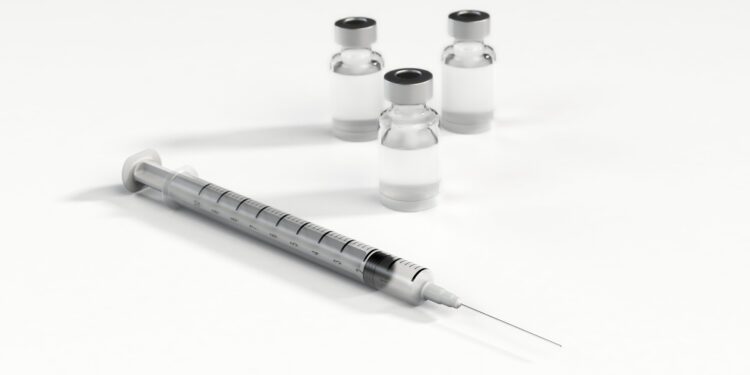Credit: CC0 Public domain
Administration of the two-dose mpox vaccine, called JYNNEOS, in doses smaller than the usual FDA-approved doses, and by injection between layers of the skin rather than by the standard route under the skin, produced a response detectable immune, according to a new study. This also happened regardless of whether people were living with or without HIV.
Led by researchers at the NYU Grossman School of Medicine, the study showed no significant difference in the strength of the immune response (as measured by the amount of detectable IgG antibodies, immune proteins that help kill the mpox virus) among most of those who received their treatment. small-dose vaccine injections between the layers of the skin (intradermally) and those who received it as prescribed full-dose injections just under the skin (subcutaneously). Due to the limited space between layers of the skin, intradermal injections can only accommodate small doses, while larger doses usually require subcutaneous injections.
The smaller doses, about a fifth of the usual full dose and spread over three months, were designed to ease a shortage of available vaccines after an outbreak in May 2022. IgG antibodies were detected in some cases more than six months later. a second and final dose of the vaccine.
The smaller dose regimen of the JYNNEOS vaccine, originally designed to protect against smallpox, a relative of mpox, but known to be effective against mpox, was approved during the shortage by the United States government in August 2022. In some cases, the prognosis may be endangered.
More than 3,800 New York City residents have been infected with the virus, transmitted through bodily fluids and skin contact, including during sexual intercourse, and primarily during the summer 2022 outbreak The mpox vaccine is now routinely recommended by the Centers for Disease Control and Prevention (CDC) for people at risk. About 155,000 New Yorkers have been vaccinated during that time, most using lower doses.
Researchers say a resurgence in the Democratic Republic of Congo in November, with nearly 13,000 suspected cases and some 600 deaths, poses the risk of a new outbreak beyond Africa, in other regions and beyond. New York in particular.
Report in the New England Journal of Medicineresearchers say they found that people fully vaccinated with two smaller doses had an immune response four times stronger than those who did not complete the vaccination series and only received one dose.
“Our study shows that smaller doses of mpox vaccine given in two doses, spread over weeks or months, were similar to the full (subcutaneous) dose approved by the FDA,” said Angelica Cifuentes Kottkamp, co-principal investigator of the study and specialist in infectious diseases. , MD.
“Implementing a lower dose was a good emergency measure in the face of an immediate shortage of vaccine,” said Kottkamp, an assistant professor in the department of medicine at NYU Langone Health.
Among its other findings, the study showed that people previously vaccinated against smallpox, as part of routine childhood immunization programs, also had a stronger immune response than those who had never been vaccinated against smallpox. Levels of IgG antibodies detectable in blood samples were 2.7 times higher in people previously vaccinated against smallpox (and then additionally given the JYNNEOS vaccine) compared to those who were not double vaccinated.
Due to their weakened immune systems, people living with HIV are particularly vulnerable to co-infection. The study found no difference in the magnitude of the immune response between vaccinated people living with HIV (with immune CD4 cell counts greater than 200) and HIV-negative vaccinated people.
“Our results provide valuable support to those most at risk of becoming infected with mpox: in the event of a resurgence of mpox, infectious disease specialists have sufficient vaccination tools and knowledge to effectively deal with it at once. short term,” said the study’s principal investigator. Mark Mulligan, MD.
Mulligan, the Thomas S. Murphy Professor in NYU Langone Health’s Department of Medicine, where he is also director of its Vaccination Center and Division of Infectious Diseases, says more research is needed to determine whether additional doses of vaccine against mpox are necessary. for “optimal” protection and to know how long, in months or years, the protection lasts. The amount of emergency stocks of mpox vaccine and/or the ability to quickly ramp up vaccine production in the event of future outbreaks, he notes, also need to be examined.
Some 145 New Yorkers vaccinated against mpox participated in the new study. Most were men (81%) and almost all (89%) identified as LGBTQ+; 35 (24%) were people living with HIV and 29 (20%) had previously been vaccinated against smallpox.
The global public health emergency declared by the World Health Organization following the mpox virus outbreak ended in May 2023, a year after it began. However, infections continue to occur globally, with more than 91,000 cases confirmed as of October 31 this year, including 167 deaths in 116 countries. In the United States, more than 31,000 people have been infected, according to the CDC, with 55 deaths. More than 1.2 million doses of the mpox vaccine have been administered in the United States
More information:
Antibody titers against the Mpox virus after vaccination, New England Journal of Medicine (2023). DOI: 10.1056/NEJMc2306239
Provided by NYU Langone Health
Quote: The Mpox vaccine triggers an equally strong immune response with lower doses in people with or without HIV, according to a study (December 13, 2023) retrieved December 14, 2023 from
This document is subject to copyright. Apart from fair use for private study or research purposes, no part may be reproduced without written permission. The content is provided for information only.



